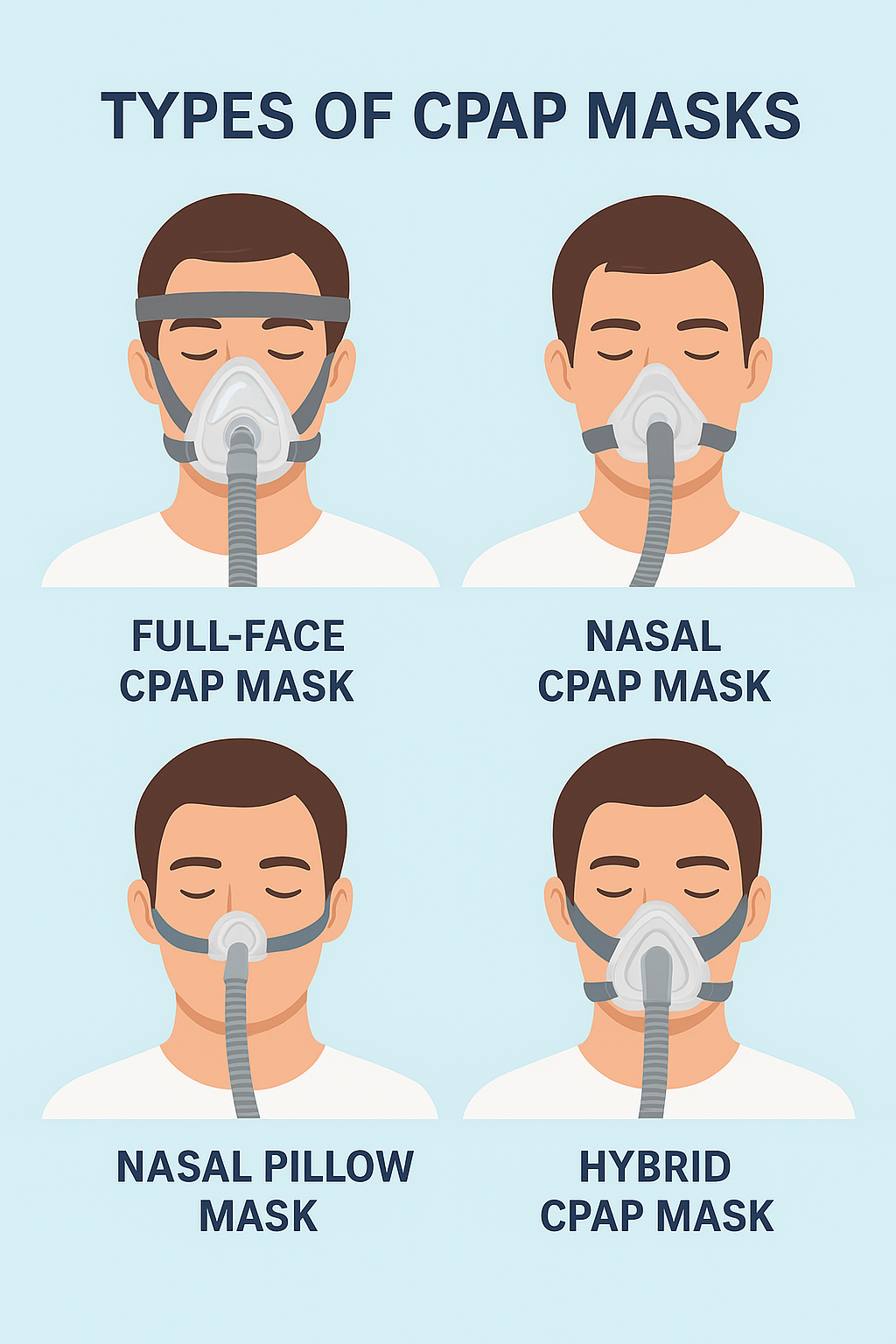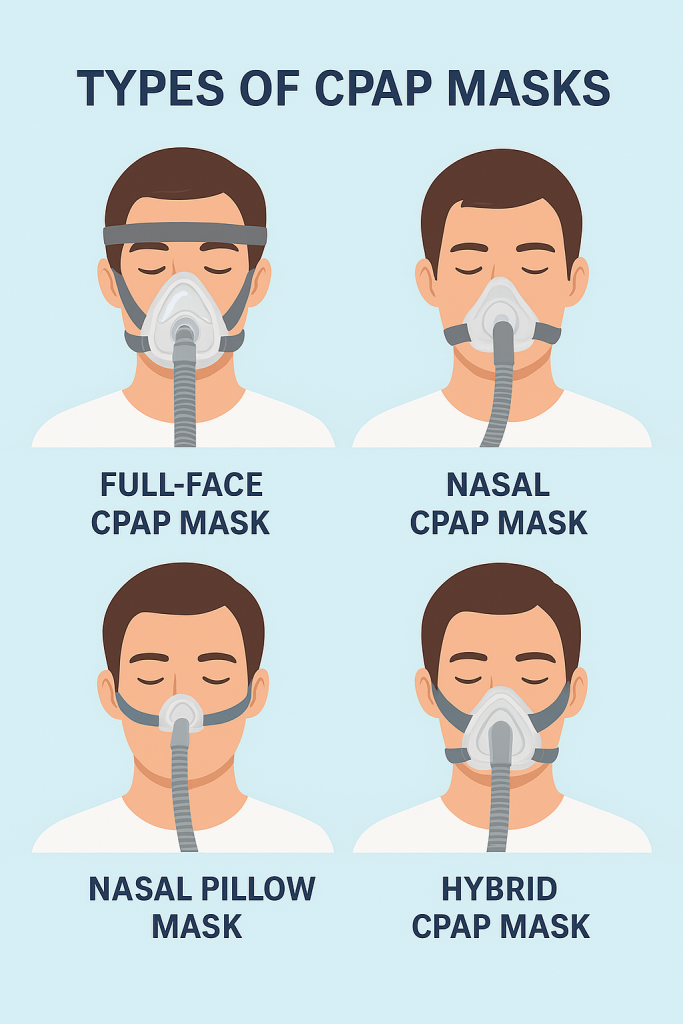CPAP Machine for Sleep: What CPAP Mask is Best for Comfort and Results


Meta Description: Discover what CPAP mask is best for your sleep needs. Learn about CPAP machines for sleep, different mask types, pros and cons, and expert tips for maximum comfort and effectiveness.
Understanding the Role of a CPAP Machine in Sleep Apnea Treatment
What is a CPAP Machine and How Does it Work?
A CPAP machine (Continuous Positive Airway Pressure machine) is the gold standard treatment for obstructive sleep apnea (OSA). It works by delivering a steady stream of pressurized air through a mask, keeping your airways open throughout the night. This prevents breathing pauses and ensures a steady flow of oxygen, which leads to deeper, restorative sleep.
The mask is the bridge between you and the therapy. A well-fitted mask ensures comfort, reduces leaks, and improves overall treatment compliance. Without the right mask, even the best CPAP machine won’t deliver results.
Why CPAP Therapy is Crucial for Sleep Apnea Patients
Untreated sleep apnea leads to snoring, fatigue, morning headaches, irritability, high blood pressure, and increased heart disease risks. CPAP therapy not only helps reduce these symptoms but also improves overall health, energy levels, and quality of life.
Common Benefits of Using a CPAP Machine for Sleep
- Reduces snoring significantly.
- Improves oxygen intake during sleep.
- Boosts daytime energy and focus.
- Helps lower blood pressure.
- Promotes better cardiovascular health.
- Restores normal sleep cycles.
Types of CPAP Masks Available
Finding the best CPAP mask is key to successful therapy. Each mask type suits different sleepers, breathing habits, and comfort levels.
Full-Face CPAP Masks
Covers both nose and mouth, ideal for mouth-breathers and those with nasal congestion.
Nasal CPAP Masks
Covers only the nose, offering a lighter and less intrusive option for those who breathe primarily through their nose.
Nasal Pillow Masks
Sit directly at the nostrils, offering minimal contact and freedom of movement—great for people who dislike bulky masks.
Hybrid CPAP Masks
A mix of full-face and nasal pillows, suitable for people who need mouth coverage but want a lighter design.
Factors to Consider When Choosing the Best CPAP Mask
Choosing the right CPAP mask isn’t a one-size-fits-all decision. It depends on personal comfort, lifestyle, and medical needs. Below are the main factors that can help you decide.
Comfort and Fit
Comfort is king. A mask that feels tight or leaves marks on your skin can make therapy unbearable. Look for a mask that offers adjustable straps, soft cushions, and minimal pressure points.
Breathing Style (Mouth vs. Nose Breathers)
- Mouth breathers usually benefit from full-face masks or hybrid masks.
- Nose breathers often prefer nasal masks or nasal pillows.
If you breathe through your mouth but want to use a nasal mask, adding a chin strap may help keep your mouth closed during sleep.
Sleeping Position (Side, Back, or Stomach)
- Side sleepers: Nasal pillows or smaller masks are ideal because they allow freedom of movement without digging into the pillow.
- Back sleepers: Can use almost any mask type comfortably.
- Stomach sleepers: Require the lightest, least obtrusive masks, like nasal pillows.
Noise Level and Air Pressure Settings
Some masks amplify the sound of airflow. If you’re sensitive to noise, look for quiet venting systems. Also, consider whether your machine has auto-adjusting pressure—since some masks handle pressure changes better than others.
Durability and Maintenance
Masks wear out over time. Cushions, headgear, and seals may need replacing every 3–6 months. Choosing a mask with easy-to-replace parts saves money and keeps therapy effective.
Pros and Cons of Each CPAP Mask Type
Full-Face Mask Advantages and Disadvantages
✔ Great for mouth breathers and people with chronic nasal congestion.
✔ Works well at higher pressure settings.
✘ Bulkier design may cause discomfort.
✘ Higher chance of air leaks if not fitted properly.
Nasal Mask Pros and Cons
✔ Lighter than full-face masks.
✔ Natural breathing pattern through the nose.
✘ Not suitable for mouth breathers.
✘ Can cause nasal dryness if humidification is not used.
Nasal Pillow Mask Benefits and Limitations
✔ Minimal contact, great for claustrophobic users.
✔ Works well for side and stomach sleepers.
✘ May irritate nostrils if not fitted correctly.
✘ Less effective at very high pressures.
Hybrid Mask Strengths and Weaknesses
✔ Combines benefits of full-face and nasal pillows.
✔ Less bulky than traditional full-face masks.
✘ Still larger than nasal pillows.
✘ Can take time to adjust to the fit.
Which CPAP Mask is Best for Different Sleepers?
Best CPAP Mask for Side Sleepers
Nasal pillow masks are the top choice since they don’t press into the pillow and allow easy movement.
Best CPAP Mask for Back Sleepers
Back sleepers can comfortably use full-face or nasal masks, as gravity helps keep the mask stable.
Best CPAP Mask for Stomach Sleepers
Stomach sleepers often struggle with bulkier masks. Minimalist nasal pillows work best here.
Best CPAP Mask for People with Facial Hair
Beards and mustaches can break the seal of a full-face mask. Nasal pillows are usually more effective in these cases.
Best CPAP Mask for Claustrophobic Users
Nasal pillows are ideal since they have minimal facial coverage and don’t obstruct vision.
Tips for Maximizing CPAP Comfort and Effectiveness
How to Reduce Mask Leaks
- Ensure proper sizing with the help of a sleep technician.
- Adjust headgear straps evenly—not too tight, not too loose.
- Replace cushions regularly to maintain a good seal.
Cleaning and Maintenance Best Practices
- Wash your mask daily with warm water and mild soap.
- Avoid harsh chemicals that can damage silicone.
- Replace filters and tubing as recommended by the manufacturer.
Adjusting Straps and Cushion Fit
Over-tightening can cause pressure sores and leaks. Instead, adjust while lying down with the machine on so you can feel the actual air pressure.
Expert Recommendations and Clinical Insights
What Sleep Specialists Suggest
Most doctors recommend starting with a nasal mask unless you’re a mouth breather. They emphasize that the best mask is the one you can tolerate every night.
Patient Experiences and Testimonials
Patients often report that trying multiple mask types before deciding improves long-term compliance. Comfort, rather than design, is usually the deciding factor.
FAQs on CPAP Machine for Sleep and Masks
What is the most comfortable CPAP mask?
Nasal pillow masks are often rated the most comfortable due to their lightweight design.
Can I switch between different CPAP masks?
Yes, many patients own more than one mask to suit different situations, like traveling or illness.
How often should I replace my CPAP mask?
Typically, cushions every 1–3 months, headgear every 6 months, and the entire mask yearly.
What if I have trouble breathing with a mask?
Try adjusting your settings, using a humidifier, or consulting your sleep specialist for alternatives.
Is it normal for CPAP masks to leak?
Small leaks are common, but large or persistent leaks need adjustment or replacement.
Do CPAP masks help with snoring?
Yes, CPAP therapy significantly reduces or eliminates snoring by keeping the airway open.
Conclusion: Choosing the Best CPAP Mask for Your Sleep Needs
The best CPAP mask depends on your breathing style, sleep position, and comfort preferences. Full-face masks suit mouth breathers, nasal masks work well for nose breathers, and nasal pillows are perfect for those who want minimal coverage.
Remember: the right mask is the one you can wear consistently. Work with your doctor or CPAP supplier to test different options. With the right fit, your CPAP machine for sleep will transform your nights into restful, refreshing sleep.
For further details, you can also explore resources from the American Sleep Apnea Association: sleepapnea.org.
















